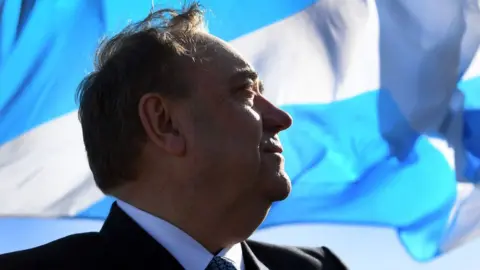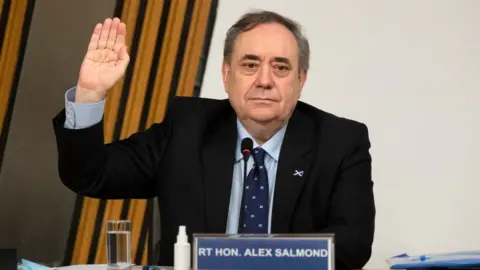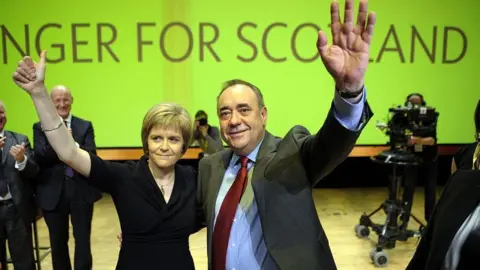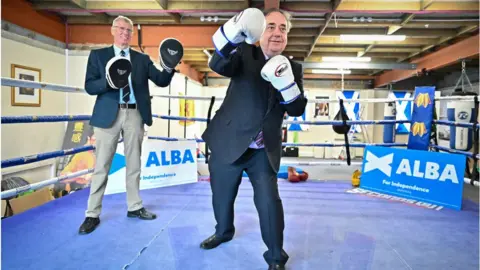Is there a future for Alex Salmond?
 Getty Images
Getty ImagesFor the past few months, a civil war has been playing out in the Scottish independence movement. After Alex Salmond's election result, has Nicola Sturgeon won?

As results from the Scottish election started to dribble in last Friday, I got a call from a well-connected SNP source. With more than a little relief in their voice, they were emphatic that Alex Salmond's Alba party had crashed and burned, with no chance of winning a seat.
Alba was launched at the start of the six-week Scottish Parliament election campaign and its presence had made some in the SNP nervous.
Not because they expected the party to win a significant number of seats - most in the SNP predicted two at the most. But the thought of Alex Salmond back at Holyrood, putting pressure on Nicola Sturgeon to move quicker on independence, a former first minister watching over his successor's shoulder and making life difficult, left some worried.
As it became clear that wasn't going to happen, that even Mr Salmond himself was going to fail to win a seat on the North East list, many in the SNP breathed a sigh of relief.
"They're dead," concluded one source close to Nicola Sturgeon.
The Salmond effect?
 Getty Images
Getty ImagesAlex Salmond launched Alba in the immediate aftermath of one of the most dramatic periods of the devolution era.
The 66-year-old had accused Nicola Sturgeon of breaking the ministerial code over her handling of sexual harassment allegations made against him - a charge which could have cost her her job as first minister.
She was cleared by the independent adviser on the code but this came after extraordinary testimony in the Scottish Parliament which laid bare the extent to which the relationship between the pair had collapsed.
Once the closest of political allies, the dream team of the SNP, they had become bitter political enemies engaged in a very public fight to be believed.
Within days Mr Salmond had launched Alba with bold ambitions.
Senior figures in the new party confidently predicted they could win up to 18 seats at Holyrood - enough to make them the fourth largest bloc in the Scottish Parliament.
They believed such a result would be a launch pad to challenge the SNP's position as the main party of independence - holding their feet to the fire with the threat that if they didn't make enough progress, Alba was ready to take up the fight.
This party didn't see itself as just a protest movement, it saw itself as a major player with significant room for growth. The polls painted a very different picture, suggesting Alba was going to struggle to make any impact at all.
But the party was convinced it was on to something, asking SNP supporters for their regional list vote. In election week, candidates still believed there would be a group of Alba MSPs at Holyrood. One told me five to eight would be a realistic target.
That confidence proved to be completely misplaced. Alba won 1.7% of the regional vote list across Scotland. That's roughly a third of what was needed.
Across the country, the party won fewer than 45,000 votes. For those who had believed a few weeks earlier than they could poll well over 10% - this was a crushing outcome.
For the SNP, it was vindication.
A source close to Nicola Sturgeon concluded: "We have triumphed. This will hopefully bury them, him in particular".
Nicola Sturgeon's triumph?
 Getty Images
Getty ImagesTalk of a new pro-independence party had been on the lips of Scottish politics watchers for a while.
Some elements of the SNP had been deeply unhappy with Nicola Sturgeon over her strategy to secure another referendum, as well as her plans to make it easier for people to self-identify their gender.
Many of them sided with Mr Salmond when he was accused of sexual harassment - and felt justified when he was cleared.
When Alba was launched, six weeks before the election, it marked a significant moment. Mr Salmond was breaking the link between some natural SNP supporters and the party.
Two MPs and a number of councillors defected. Alba said it had 5,000 members - and believed many of them were the most active in the independence movement.
But Mr Salmond struggled for air time - frequently criticising broadcasters like the BBC for not paying more attention to the party during the campaign. When he did interviews, he faced difficult questions about his past conduct.
Some in the independence movement were horrified at Mr Salmond's approach to the campaign and Alba's use of Robert the Bruce's memory in a campaign video.
Mr Salmond's personal approval ratings were, some polls suggested, even lower than Boris Johnson's in Scotland.
The Alba strategy appeared to win over the more radical supporters of independence, who were fed up of what they saw as delay. It turned out not enough people were prepared to abandon the SNP to make an impact.
As the dust settles after the election, Ms Sturgeon sits in a more comfortable position than she has for some time. The SNP has shown it can still win electoral support across the movement.
Ms Sturgeon's position of holding an independence referendum once the Covid pandemic has passed is supported by the Scottish Greens.
The two pro-referendum parties who make up a majority in the Scottish Parliament agree that a referendum should happen in the next five years, but don't want to rush it. Neither wants to adopt Mr Salmond's approach of going into independence talks quickly.
There will still be pressure on Ms Sturgeon from within her party and the wider movement. There are prominent figures who believe she has been too timid and hasn't done enough to force another referendum in the face of opposition from Downing Street.
It is less than clear how the impasse between Edinburgh and London will end, but Ms Sturgeon has more control over her own side.
Her pitch led to another comfortable election victory, while the more militant approach of Mr Salmond failed to yield results.
So is this the end of Alex Salmond?
Alba be back?
 Getty Images
Getty ImagesDespite the humiliating result, it seems Alba isn't ready to throw in the towel just yet.
On Friday the party confirmed it will contest next year's council elections in Scotland, and last week Mr Salmond said it would continue to make the case for more urgency on independence.
"Alba is here to stay," he declared. "In only six weeks Alba has established itself as a political force with which to be reckoned."
The confidence of the campaign has not disappeared. The two MPs who defected when Alba was launched still plan to form a group at Westminster.
Kenny MacAskill, the former Scottish justice secretary, is one of them. He told me: "Those who want an independent Scotland AND a radical agenda need a home - Alba will be there".
There is little sign of regret from those who defected from the SNP. They still believe their former party has gone soft on independence - and that pressure will be needed in the coming years.
They continue to believe the plan to target regional list votes could have worked if more people had voted tactically - one candidate pointed to the SNP winning a million regional votes - which won it just two seats under the system.
Mr MacAskill believes the Holyrood campaign was too short for Alba to make an impact - but that their message was correct. Over time, he argues, it will have a role in Scottish politics.
But some believe that Mr Salmond's career is now essentially over. One SNP politician told me: "It's sad in some respects. But in others I think, hell mend you".
Another senior SNP figure said: "They should never get an inch of coverage ever again".
Alex Salmond has been one of the most significant figures in modern Scottish politics. But in the last couple of years, he has also been one of the most divisive - particularly with his own side.
Some see him as a hero who is dedicated to the cause - others a narcissist who launched Alba to keep himself relevant.
It is unlikely Mr Salmond will disappear from the public eye completely. He is still planning to sue the Scottish government again over its unlawful handling of harassment allegations against him.
He may well still try and influence the debate over independence. Alba is keen for him to stay on as leader and grow the party.
But after a number of political comebacks, a return to the Scottish Parliament proved too much.
Some in the SNP hope it is the end of the career of a man they once idolised.
